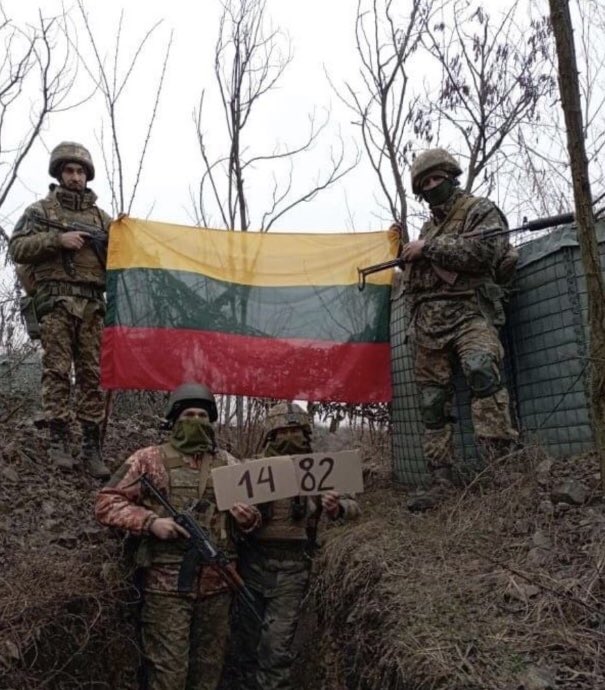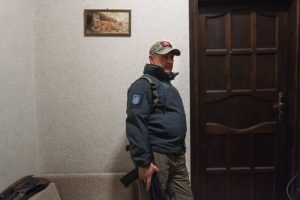
LRT.lt Tells an Important Story
On the outskirts of Kyiv, a team of Lithuanian volunteers, AKs in hand, are moving in pairs, putting rounds into a target bearing a caricature of Vladimir Putin. Around them, the blaring air raid sirens are a reminder that they are not merely practising – they are here to fight Russia.
The outfit of Lithuanian volunteers is led by Sigitas Maliauskas. Like everyone else, he introduces himself using his callsign – Pagonis (The Pagan). Their team of six Lithuanians is joined by three Ukrainians.

The group was asked to form a Lithuanian unit that could do autonomous tasks such as reconnaissance, includng setting up a network of contacts in their operating area, which remains under the control of Ukraine, to have “eyes and ears” that could inform them of Russian troop movements. The Ukrainian leadership has also asked them to prepare for hit-and-run missions to target Russian convoys. Since the beginning of the Russian invasion on February 24, the Ukrainian military has surprised most analysts with its ability to fight light and inflict heavy casualties.
In early April, three more Lithuanian volunteers arrived to join the fight. A car with Lithuanian licence plates entered the parking lot of a Kyiv hotel, which has now become a centre for international volunteers. The hotel is a collection and distribution centre for internationals, such as Georgians, Poles, Spanish, and Scottish fighters. Drivers of armoured vehicles arrive and are then sent to different battalions of the Ukrainian military. The crew would still like for more Lithuanians to join them, but they are careful about letting anyone in.
“If the Russian army is not smashed here,” it could reach Lithuania, Maliauskas says. “We are helping Ukrainians here, so indirectly we are also defending our families in Lithuania.”
On February 27, just three days after the Russians struck, Ukrainian President Volodymyr Zelenskyy called for foreign volunteers to join the fight, saying “this is not just a Russian invasion of Ukraine, it is the beginning of a war against Europe”.
In the eight years of the war in Donbas, basic supply issues have persisted. Self-organization and grassroots support – something which had blossomed during the Euromaidan revolution and erupted again after Russia invaded the country – has always been necessary to fill the gaps.
International volunteers have previously taken to social media to complain of ammunition shortages, not being provided with an adequate kit, or even enough weapons. But this is something that Ukrainians have themselves faced for years.
For Lithuanians, the war in Ukraine is more than that. Here, the war is as close to home as it can get. Currently, their team is part of the 9th Kyiv Territorial Defence Battalion, outside the purview of the Foreign Legion. Pagonis says they are using their status merely as an umbrella to operate legally in the country as a stand-alone group. But the exact structure remains difficult to grasp, with Pagonis himself admitting that “things are changing daily”.
They first volunteered to train mobilized Ukrainians in Lviv, condensing a three-month basic course into just two weeks, before proceeding to Kyiv. Now, along with preparing for combat duties themselves, they will also train Ukrainian scouts.
It is impossible to establish the number of foreign fighters currently in Ukraine. According to the statistics announced by Ukraine in March, 20,000 people from 52 countries have answered the call to fight. The number of Lithuanians involved is also undetermined.
Although officially part of the Ukrainian Armed Forces, they are yet to receive a wage. According to Pagonis, other international volunteers are also yet to be paid. For now, they are funded entirely by donations from Lithuanians, including high profile business owners.
“Over time, we found our donors,” says Pagonis. The team also collects funds via direct donations, as well as the crowdfunding Contribee platform. “Our presence here […] is a very big moral encouragement for the Ukrainians so that they do not feel alone,” says Pagonis. LRT.lt
Photo: Maliauskas



























